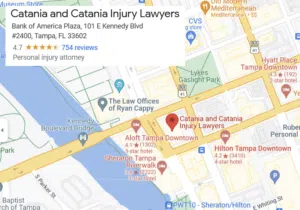
Most personal injury cases are based on negligence. One person is careless and, as a result, someone else gets hurt. But, personal injury cases can exist without negligence. Most often, these cases arise because one party is strictly liable for their actions under the law – regardless of how much care and attention they pay to their actions.
Table of Contents
Strict Liability Can Apply in Civil and Criminal Cases
Strict liability laws apply in both civil and criminal cases. Strict liability laws are in place to promote public health and safety.
In civil law, strict liability is meant to hold someone financially responsible for harm that results from certain activities. Inherently dangerous activities like excavation typically require explosives. If these explosives cause damage or harm to anyone, then the company using the explosives could be held strictly liable for the results. The company could be held liable even if they did everything carefully and legally.
In criminal law, strict liability is meant to hold someone criminally accountable for certain illegal activities. Statutory rape is an offense that criminalizes sex with an individual under a certain age. Regardless of the mindset of the offender, he or she can be held criminally responsible for sexual activity with an individual under the age of consent. This person will be held strictly liable even if the minor lied about their age.
Which Personal Injury Cases Can Rely on Strict Liability?
If you have been injured and are seeking to file a lawsuit, then you might be wondering if you can make a strict liability claim.
Under Florida law, there are three main types of situations where strict liability laws apply:
- Defective products: If a manufacturer designs or sells a product with a defect, then you can file a product liability claim for your injuries.
- Inherently dangerous activities: If someone engages in an inherently dangerous activity, such as using explosives, then you can file a strict liability claim for any harm that results.
- Animal injuries: Animal owners are strictly liable for any injuries their animals cause. In Florida, this also includes dog bites.
If you have been injured by any of the above situations, then make sure you speak to an attorney as soon as possible to determine if you have a strict liability case.
What Do You Have to Prove in a Strict Liability Case?
To win a strict liability claim, you must show that you were harmed and that you are entitled to compensation because of the harm. You do not have to prove that the defendant meant to harm you, or that they were negligent. The main thing you need to show in a strict liability claim is that you are someone who should be compensated for your harm.
A judge or jury will not examine whether a defendant was careful in the activity that caused you harm in a strict liability case. The harm is enough. With strict liability, the court wants to ensure that injury victims are more easily compensated.
What Can You Recover in a Strict Liability Case?
Strict liability claims can recover the same type of damages that are available in negligence and intentional tort claims.
Strict liability cases can seek several types of damages including:
- Lost wages
- Medical bills
- Pain and suffering
- Mental anguish
- Loss of consortium
- Property damage
Strict liability claims can recover both economic and non-economic damages as listed above. Strict liability claims can also recover punitive damages if the court finds the defendant’s conduct to be especially outrageous. Punitive damages are meant to punish the defendant’s conduct by making them pay additional damages on top of economic and non-economic damages.
Punitive damages are also meant to prevent others from copying the same bad conduct. Our attorneys at Catania and Catania Injury Lawyers can answer all the legal questions you have. Please call us today at (813) 222-8656 or contact our Tampa personal injury office online so we can help!




